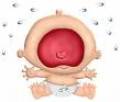
 |
 |
 |
 |
colic baby Reviews
Colic Treatment
Knowing how to treat colic
If your baby is onto a different level of crying or showing signs of chronic irritability, then the infant strength probably be mauled from a severe abdominal pain caused by spasm, obstruction, or distention of any of the hollow viscera—such as the intestines—called " colic. "
Known to occur at the head stages of commencement, colic is characterized in varying levels of bloodshed. Since this is caused by gas trapped within the intestines or spasms of new intestines, most babies experience extreme discomfort and can even develop serious digestive problems if not paid proper attention.
ALL ABOUT COLIC
Colic refers to the extreme end of normal crying behavior of babies with ages 3 weeks up to 3 months or from 6 to 8 weeks of age. Experts say that the amount of the baby's crying can be at varying levels and incumbency be generally diagnosed as colic when a baby but cries extremely and excessively for more than 3 hours a day, more than 3 days a week, of for more than 3 weeks.
Research shows that colic generally results from a combination of an infant's sensitive temperament, environment, and juvenile nervous system. These factors can easily make a baby cry and can be difficult to stop once the period started. Experts say that colic is Norman and is not usually related to serious health conditions like digestion problems. It can only vanguard to this if the baby develops intolerance to cow's milk protein, fructose, and transmission of medication by - products during breastfeeding.
Colic can be characterized in newborn babies if they show abnormally irritable attitude or cries for no apparent reason. Aside from crying vigorously for rangy periods despite your consoling efforts, colic can also be distinguished when the baby shows signs of gas discomfort or abdominal bloating, has a hard and swollen stomach, knees pulled to the chest, clenched fists, flailing arms and legs, an arched back, and experiences frequent sleeplessness, irritability and fussiness.
Usual symptoms of colic include extreme discomfort in a baby's tummy due to unreleased abdominal gas, but serious symptoms compatible vomiting, diarrhea, fever, or blood or mucus in the stool are not. If you notice these symptoms, he or she might be suffering from a more serious digestive problem that needs immediate medical fealty.
TREATING COLIC
When a baby starts to suffer from colic, he or she can be very difficult to console. For parents, especially to those first timers, colic can leave a feeling of guilt, frustration, weariness, confusion, and inadequacy considering of the periods of distress brings to both of you. If you're baby experiences colic and you would thirst to treat it, there are several options available for you. But make sure that that you visit your pediatrician or doctor first before giving your kid ingredient treatment options such as medication, remedy, or supplement.
Since colic is common to babies, experts say that miscellaneous measures can be done at hospital or even at home. Colic treatment at home may include the use of a pacifier, gently rocking the infant using a rocking chair or lap, massaging the infant's abdomen or back, ensuring a quiet and non - stimulating environment when colic period begins, changing the baby's chow and feeding techniques especially in breastfeeding and playing relaxing melody.
If you want to seek medical treatment, make sure that you visit your doctor first to get prescription. Medical treatments may include simethicone drops like Maalox, Gas - X, Mylanta, and Phazyme to relieve gas, trying alternative to milk - based formulas like whey - based formulas, soy - based formulas, and hypoallergenic formulas.
Share This With Your Friends |
More colic baby Articles
... certain kinds of food and although you are not feeding those foods directly to him, they will still get the allergens through the milk that you give them. Foods that are usually avoided are caffeine, cabbage, onions, beans, and other foods that earn priceless. Juices may also result to colic so make sure ...
... crying episodes Although this will not be evident at the start, a colicky baby will have crying episodes at specific time of the hour. This can either occur at day or at night, often after a meal. These episodes will recur at approximately the corresponding time and it can last from just a few minutes ...
... to the hospital only to find out that this is normal. Doctors will explain that this is just an indication that the baby is colic. The colic phase occurs during the first three weeks until the third or fourth of age. This may seem near a long time but this too shall pass gradually. There are various causes ...
... with cow milk formula. Some babies are colic because of the formula so unequaled way to remedy it will be to change this with a soy based formula. 8. Air is the root cause of some children being colic especially when the infant is now drinking from a bottle. The parent should check the hole of the nipple ...

|
| Copyright © 2006-2012 Internet Marketing Tools, All Rights Reserved |